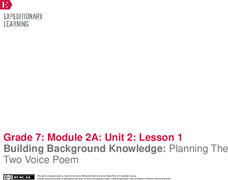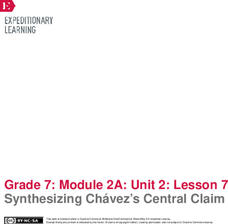PBS
Cesar Chavez: Labor Leader and Civil Rights Activist
Cesar Chavez believed so much in the cause of farmworkers that he put his money where his mouth was. Chavez quit his well-paying job to organize them into labor unions. Using a speech, photograph, and short biographical video, pupils...
Anti-Defamation League
Who Was César Chávez?
Scholars complete a KWL chart to indicate what they know about Cesar Chavez and then research what they want to know about this farm worker, labor leader, and civil rights activist. To complete the lesson, scholars research modern civil...
National Endowment for the Humanities
"Sí, se puede!": Chávez, Huerta, and the UFW
"Sí, se puede!" Cesar Chavez and Dolores Huerta believed organizing farm workers and changing their working conditions were possible. Scholars examine provisions of the Bracero Program, videos, and the United Farm Workers' (UFW) work....
K20 LEARN
Civil Rights for All: Civil Rights Movement
The Civil Rights Movement was only the beginning. Using images and a series of queries, learners consider current fights for equality. After viewing video clips profiling the women's rights movement, the American Indian Movement, and...
National Woman's History Museum
Introduction to Activism
Activist, feminist, and labor organizer Dolores Huerta are perhaps best known for her work with Cesar Chavez to create the United Farm Workers. Class members explore primary source documents to learn more about this Medal of Freedom winner.
EngageNY
Reading Closely and Introducing Rhetoric Toolbox: Unions as Agents of Change—Part 1
Scholars explore the question of whether labor unions are the agents of change as they continue reading César Chávez's 1984 speech, "Address to the Commonwealth Club of California." They discuss rhetoric in Chávez's speech and discover...
Center for Civic Education
In the Shadows, Agents of Change
Most of your learners have probably heard of Martin Luther King, Jr., or Cesar Chavez, but could they also recognize the names of Betty Friedan or Dolores Huerta? Give your learners the opportunity to discover the many accomplishments of...
EngageNY
Building Background Knowledge: Planning The Two Voice Poem
Scholars build background knowledge to understand the life and work of the union leader and labor organizer César Chávez. As they read teacher-selected resources, they complete a Building Background Knowledge worksheet and engage in...
EngageNY
Reading Closely: Introducing Chávez’s Commonwealth Club Address and Considering the Plight of the Farmworker
How can a persuasive speech help inspire social change? Scholars read along as they listen to the first half of César Chávez's 1984 speech, "Commonwealth Club Address." Next, pupils use graphic organizers to analyze one of Chávez's...
EngageNY
Speech Structure: Unions as Agents of Change— Part 2
Scholars continue reading César Chávez's 1984 speech, "Address to the Commonwealth Club of California." Working with partners, they complete graphic organizers to determine a claim that Chávez makes about the UFW.
EngageNY
Speech Structure: Part 2 of the Commonwealth Club Address
Scholars continue reading and analyzing César Chávez's 1984 speech, "Address to the Commonwealth Club of California." Working with partners, they answer text-dependent questions about how governments and consumers affect working...
EngageNY
Synthesizing Chávez’s Central Claim
Class members play an interactive game, matching strips of paper containing rhetorical devices with examples from César Chávez use rhetoric in his 1984 speech, "Address to the Commonwealth Club of California." Next, partners discuss...
Facing History and Ourselves
California Grape Workers’ Strike: 1965–66
The California grape workers' strike of 1965-66 is the focus of a lesson that asks high schoolers to investigate the strategies farmworkers used to organize and gain contracts with grape growers that ensured higher waters and better work...
National Woman's History Museum
Dolores Huerta and the Delano Grape Strike
Few have heard of Dolores Huerta and her part in organizing the California farm workers, establishing the United Farm Workers union and orchestrating the Delano Grape strike. High schoolers consider why this powerful woman has been...
Center for Civic Education
The Power of Nonviolence: Change Through Strategic Nonviolent Action
How did major historical figures, such as Henry David Thoreau, Susan B. Anthony, and Mohandas K. Gandhi, explain and defend their beliefs in nonviolence? Your learners will begin by studying the backgrounds of these individuals, and then...
Other popular searches
- Cesar Chavez Day
- Cesar Chavez Lesson Plan
- Esl Cesar Chavez
- Cesar Chavez Bio Poem
- Cesar Chavez Speeches
- Cesar Chavez Storyboard
- Labor Strikes Cesar Chavez
- Spanish Cesar Chavez
- Cesar Chavez Web Quest
- Cesar Chavez Leson Plan
- Julio Cesar Chavez
- Cesar Chavez Webquest
















